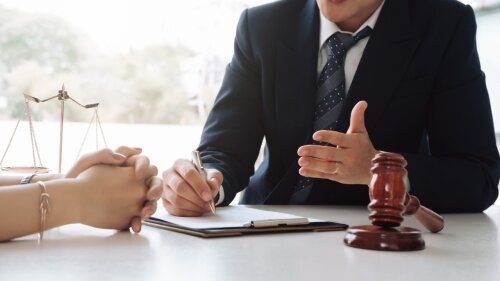Best Car Accident Lawyers in West Virginia
Share your needs with us, get contacted by law firms.
Free. Takes 2 min.
Or refine your search by selecting a city:
List of the best lawyers in West Virginia, United States
About Car Accident Law in West Virginia, United States
Car accident law in West Virginia is primarily aimed at determining who is responsible when a car crash occurs and ensuring that injured parties can receive compensation for damages. This area of law covers issues such as liability, insurance requirements, personal injury claims, property damage, and compensation for lost wages or medical bills. If you are involved in a car accident in West Virginia, you may need to navigate complex legal procedures, negotiate with insurance companies, and adhere to state-specific law and deadlines to fully protect your rights.
Why You May Need a Lawyer
After a car accident, it can be challenging to handle legal, medical, and insurance matters on your own. You may need a lawyer if:
- The accident involved injuries or significant property damage.
- There is a dispute regarding who is at fault.
- The insurance company is denying your claim or offering a low settlement.
- You are facing legal action from another driver or passenger.
- You are unsure about your rights or the value of your claim.
- The accident involved an uninsured or underinsured driver.
- There are multiple parties involved, leading to complex liability issues.
An experienced car accident lawyer can help protect your interests, gather evidence, negotiate with insurance companies, and represent you in court if necessary.
Local Laws Overview
Understanding West Virginia's specific laws is important when dealing with car accidents. Some key aspects include:
- Fault-Based System: West Virginia operates under a "fault" system, meaning the person responsible for causing the accident is typically liable for damages.
- Comparative Negligence: West Virginia follows a modified comparative negligence rule. You can recover damages if you are less than 50 percent at fault. However, your compensation will be reduced by your percentage of fault.
- Minimum Insurance Requirements: Drivers in West Virginia must have liability insurance with minimum coverage amounts set by state law.
- Statute of Limitations: In most cases, you have two years from the date of the accident to file a personal injury or property damage lawsuit.
- Reporting Accidents: Under West Virginia law, you must report accidents to local authorities if they result in injury, death, or property damage of $1,000 or more.
- Uninsured and Underinsured Motorist Coverage: West Virginia requires drivers to carry this coverage to help protect against accidents involving uninsured or underinsured drivers.
Frequently Asked Questions
What should I do immediately after a car accident in West Virginia?
Ensure everyone's safety, move vehicles if possible, call law enforcement, exchange information with other parties, obtain witness information, take photos, and seek medical attention if necessary.
Do I have to report every car accident in West Virginia?
You must report accidents that result in injury, death, or property damage of at least $1,000 to the local law enforcement agency immediately.
How is fault determined after a car accident?
Fault is determined by examining evidence such as police reports, witness statements, photos, and traffic laws. Insurance adjusters and, if necessary, courts make decisions about who was at fault.
What if I am partly at fault for the accident?
West Virginia's comparative negligence law allows you to recover damages if you are less than 50 percent at fault. Your compensation is reduced by your percentage of fault.
Do I have to accept the insurance company’s first settlement offer?
No, you are not required to accept the first offer. It is often advisable to consult an attorney before agreeing to any settlement to ensure you receive fair compensation.
Can I pursue compensation if the other driver was uninsured?
Yes, if you have uninsured motorist coverage as required by West Virginia law, you can file a claim with your own insurer for damages caused by an uninsured driver.
How long do I have to file a lawsuit after a car accident?
You generally have two years from the date of the accident to file a personal injury or property damage lawsuit in West Virginia.
What kind of damages can I recover after a car accident?
You may be entitled to compensation for medical expenses, lost wages, pain and suffering, property damage, and, in some cases, punitive damages.
Can I handle my car accident claim without a lawyer?
While it is possible to handle simple claims on your own, consulting a lawyer is recommended if there are injuries, disputed liability, or insurance disputes.
What documents do I need to start a car accident claim?
You'll need the police report, medical records, photos from the scene, witness information, insurance information for all involved parties, and records of any communication with insurance companies.
Additional Resources
- West Virginia Division of Motor Vehicles (DMV) - Information on reporting accidents and auto insurance requirements.
- West Virginia Office of the Insurance Commissioner - Guidance on insurance claims and consumer rights.
- West Virginia Judiciary - Access to court forms and legal information for personal injury cases.
- Local legal aid organizations - Assistance for those who may not be able to afford a private attorney.
Next Steps
If you have been involved in a car accident in West Virginia and believe you may need legal assistance, start by gathering all relevant documentation including police reports, photos of the accident, insurance policies, and medical records. Consider contacting a licensed local car accident attorney as soon as possible to discuss your situation and review your legal options. An attorney can help you understand the strength of your case, negotiate with insurance companies, and represent you if your case goes to court. In urgent cases, especially those involving serious injury, do not hesitate to seek both medical and legal help immediately.
Lawzana helps you find the best lawyers and law firms in West Virginia through a curated and pre-screened list of qualified legal professionals. Our platform offers rankings and detailed profiles of attorneys and law firms, allowing you to compare based on practice areas, including Car Accident, experience, and client feedback.
Each profile includes a description of the firm's areas of practice, client reviews, team members and partners, year of establishment, spoken languages, office locations, contact information, social media presence, and any published articles or resources. Most firms on our platform speak English and are experienced in both local and international legal matters.
Get a quote from top-rated law firms in West Virginia, United States — quickly, securely, and without unnecessary hassle.
Disclaimer:
The information provided on this page is for general informational purposes only and does not constitute legal advice. While we strive to ensure the accuracy and relevance of the content, legal information may change over time, and interpretations of the law can vary. You should always consult with a qualified legal professional for advice specific to your situation.
We disclaim all liability for actions taken or not taken based on the content of this page. If you believe any information is incorrect or outdated, please contact us, and we will review and update it where appropriate.
Browse car accident law firms by city in West Virginia
Refine your search by selecting a city.










